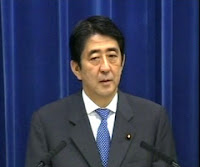
Click here to sign up to participate in International Bloggers’ Day for Burma.
Author: Gerald Giam
What are your priorities, Mr Policeman?
This evening, as I made my way from Orchard MRT to the Myanmar Embassy to sign the petition to voice my revulsion at the brutal quelling of peaceful protests in Myanmar last week, I saw two prostitutes in front of Orchard Delphi (near the junction with Claymore Road) soliciting for clients. Their target clients were clear: single, Caucasian men.
A short distance down, as I walked up St Martin’s Drive where the embassy is located, I saw two policemen and a policewoman in plain clothes doing nothing but standing there eyeing every one walking up towards the diplomatic mission. At the embassy’s entrance, where a round-the-clock candlelight vigil is being held, another three or four policemen where there doing nothing productive except manning a videocamera mounted on a tripod, filming all the visitors as they went by.
I walked back down towards the MRT station a few minutes later. Those two prostitutes were gone (presumably with their clients). But again, in front of Delphi, another three prostitutes were there, smiling at Caucasian men who walked by and sometimes taking them by the hand and whispering something into their ears. None of the men succumbed to their charms.
I felt frustrated by this situation. Many tourists come to Singapore expecting a clean, wholesome place, free of vices normally associated with inner cities and Third World countries. Many of those men who were approached probably had a whole different story about Singapore to tell to their friends and family back home.
I decided to call the nearby police station to report this. The officer on the line told me he had sent in a request to the patrol, and that police officers will be there very soon. I waited for 10 minutes, and seeing no police car arriving, decided to just go home. However just down the road, I saw another policeman who looked like he was booking a motorist for a traffic violation. I approached him and reported the soliciting prostitutes. He told me plainly (albeit politely) that he did not have the authority to approach them, but would call in the anti-vice unit to have them handle it.
I don’t know what the outcome of this is. Perhaps the policemen eventually came. But what I can’t fit together is why our police would waste the manpower of six to 7 officers to eye a small candlelight vigil, while taking so long to respond to actual criminal activity taking place nearby.
What are their priorities? Keeping our streets safe and free of vice activities, or playing Steven Spielburg and filming and intimidating people who are peacefully expressing their genuine concern for their fellow human beings in Myanmar?
Update:
I wrote separately to the police’s “SPF Service Improvement Unit” to complain about the lack of enforcement all these years. This was their reply:
“Dear Sir
We refer to your email of 4 October 2007.
Police will continue to monitor the situation in Orchard Road closely and
will take enforcement action where necessary against any illegal
activities.We thank you for your feedback.”
I encourage readers to call the police to report every time you see prostitutes soliciting in the Orchard Road area (prostitution is not illegal, but soliciting is). The number to call is 1800-7359999 (Orchard Police Post).
Once they get more complaints, they will feel under pressure to act on it. If no one complains, they will just continue to “close one eye” to the situation.
Myanmar junta leader’s family reportedly in Singapore
London’s The Times has reported that the family of Myanmar’s dictator, Senior General Than Shwe, has left Myanmar and is currently in Singapore.
Citing a report by the Democratic Voice of Burma (DVB), an established Myanmarese dissident radio station based in Norway, The Times reported that Than Shwe’s wife, daughter and son-in-law have arrived with other family members in Singapore. Than Shwe’s son-in-law, Teza, who is incidentally also Myanmar’s richest man because of his family connections, then flew off to Dubai and is staying at the seven-star Burj Al Arab Hotel, arguably the world’s most luxurious hotel. A DVB correspondent apparently was able to establish that Teza was indeed staying at the the Burj.
This adds to a growing list of Myanmar junta leaders who have made Singapore their “home away from home”. Than Shwe himself was recently in Singapore for medical treatment, and the current prime minister, General Soe Win, has been at Singapore General Hospital (SGH) receiving treatment for leukaemia since May.
Related reading:
- Singapore, a friend indeed to Burma, Sydney Morning Herald, 1 Oct 2007
- Stop admitting top military leaders from Burma petition
PM Lee’s letter to Myanmar’s top general
Text of Letter from Prime Minister Lee Hsien Loong to Senior General Than Shwe, Chairman, State Peace and Development Council, Union of Myanmar. Original MFA press release is here. Salient portions have been highlighted.
29 September 2007
Dear Excellency,
In Singapore’s capacity as the ASEAN Chair, I write to express the deep concerns that other ASEAN leaders and I share over the very grave situation in Myanmar.
I have discussed this matter with all the other ASEAN leaders. We are most disturbed by reports of the violent means that the authorities in Myanmar have deployed against the demonstrators, which have resulted in injuries and deaths. The videos and photographs of what is happening on the streets of Yangon and other cities in Myanmar have evoked the revulsion of people throughout Southeast Asia and all over the world.
We agree that the confrontation that is unfolding in Myanmar will have serious implications not just for Myanmar itself, but also for ASEAN and the whole region. Hence, our Foreign Ministers issued a firm statement in New York, strongly urging your government to exercise utmost restraint, and to work towards a political solution for national reconciliation and a peaceful transition to democracy. ASEAN also called for the release of all political detainees, including Daw Aung San Suu Kyi. I attach a copy of this statement.
The ASEAN Leaders fully support the mission by the Special Advisor to the United Nations Secretary-General, Mr Ibrahim Gambari. He has gone to Myanmar to help all parties involved find a peaceful resolution. I would like to emphasise the importance which the ASEAN countries, and indeed the whole international community, attach to Mr Gambari’s mission. We strongly urge your government to grant Mr Gambari full access to all parties in Myanmar, as you have done in the past, and to work with Mr Gambari to try to find a way forward.
ASEAN’s concerns are for the welfare of the people of Myanmar, for a return to stability and normalcy, and for Myanmar to take its place among the comity of nations. I hope you will consider these views in that spirit.
Yours sincerely,
(Signed)
LEE HSIEN LOONG
Video clip of Japanese journalist being shot by Myanmar police
These are the shocking videos of the last moments of the Japanese journalist, Kenji Nagai, as he was shoved to the ground and shot at point blank by Myanmarese riot police on 27 Sep. Notice that immediately after Nagai-san is violently shoved onto the ground, at least four shots from an automatic rifle ring out. The doctor in the Japanese embassy in Myanmar confirmed that a bullet entered Nagai-san’s body from the lower right side of his chest, pierced his heart and exited from his back. This suggests that he was shot as he was down on the ground (refer to the picture I posted in yesterday).
[youtube=http://www.youtube.com/watch?v=yXk5Ulppktk]
Singaporean intentionally shot by Myanmar police; Japanese journalist apparently shot point blank
This is an account of a Singaporean who was shot by riot police in Myanmar while on his way to work:
Below is an actual of what had happen yesterday on 27/9/07.
I am a Singaporean working in Myanmar for the past 11 years.
I was on my way to office (near Thuwana area) at around 4 to 4.30pm when the riot police block the road near “Super one, ILBC area”. I stop my car with my wife and walk out. suddenly riot police and soldiers drove the truck around the corner and start firing shots at the crowd. we quickly ran to the side and squat down near the wall.The soldiers came down and start to shoot at us. I was shot twice but i did not know what hit me. My both leg were bruised. the soldiers and police kicked us and the rest of the crowds into the drain and shouted that they would kill us if we look at them.
We were forced to stay in the drain for 15 mins and gather by the into a group.
A commander came and gather his troops and drove off to Tamwe direction.
After that ,i looked at my injures and and found injures on my left and right legs.
My wife found the “40mm riot control munnition” empty cartridge that the soldiers shoot at me.I would like the embassy and media to know the actions of this army.
We are just ordinary citizen going to work and they just shot at us for no reason.
Imagine what they would do to the protesters!I would like the Singapore government would make a strong stand against this violence crack down on the monks and people.
attached is the photo of my injures .
I have been attended by a private doctor on my injures.
The doctor said i was very lucky that the shot missed the groin area.
You can see the photos of his injuries on ko-htike’s blog.
In separate news, revelations have surfaced that Kenji Nagai, the Japanese journalist who died yesterday, was apparently intentionally shot at point blank range. Here are the pictures from thisislondon.co.uk:
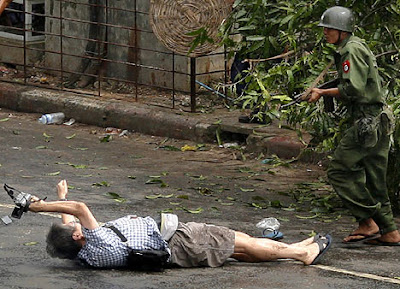

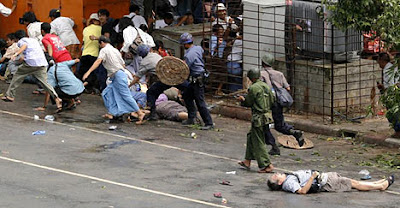
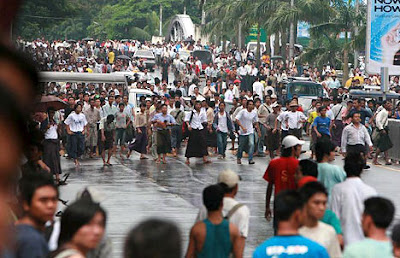
I wonder what is going through the minds of the soldiers. Don’t they have families and loved ones too? Perhaps some of their own relatives are out protesting on the streets too. Have they been so thoroughly indoctrinated by their commanders that they do not hesitate to spray automatic rifle fire into their on countrymen? Truly, evil knows no bounds.
Sep 27 Statement by ASEAN Chair, Singapore’s Minister for Foreign Affairs George Yeo
The ASEAN Foreign Ministers had a full and frank discussion on the situation in Myanmar at their Informal Meeting this morning in the UN and agreed for the Chair to issue this Statement. They were appalled to receive reports of automatic weapons being used and demanded that the Myanmar government immediately desist from the use of violence against demonstrators. They expressed their revulsion to Myanmar Foreign Minister Nyan Win over reports that the demonstrations in Myanmar are being suppressed by violent force and that there has been a number of fatalities. They strongly urged Myanmar to exercise utmost restraint and seek a political solution. They called upon Myanmar to resume its efforts at national reconciliation with all parties concerned, and work towards a peaceful transition to democracy. The Ministers called for the release of all political detainees including Daw Aung San Suu Kyi.
The ASEAN Foreign Ministers expressed their concern to Minister Nyan Win that the developments in Myanmar had a serious impact on the reputation and credibility of ASEAN. They noted that Singapore’s Prime Minister Lee Hsien Loong has spoken to his ASEAN counterparts over the past day, and will be writing to Senior General Than Shwe.
The ASEAN Foreign Ministers gave their full support to the decision of UN Secretary-General Ban Ki-moon to send Special Envoy Ibrahim Gambari to Myanmar. They welcomed FM Nyan Win’s assurance that a visa would be issued to Mr Gambari in Singapore. They asked the Myanmar government to cooperate fully and work with him. Mr Gambari’s role as a neutral interlocutor among all the parties can help defuse the dangerous situation. The Ministers urged the Myanmar government to grant him full access to all parties in Myanmar, as they had done in the past.
Statements, and more statements. To be fair, put into perspective, ASEAN’s latest statement is slightly more strongly worded than usual. It’s good that PM Lee is writing directly to Than Shwe, Myanmar’s top dictator. I hope it contains even stronger words than the above statement. French Foreign Minister Bernard Kouchner told reporters at the UN that “pressure from Asean is the strongest tool we have” to stop the violence. I hope ASEAN leaders understand the weight of responsibility that the grouping has to prevent further violence against civilians.
Singapore needs to demonstrate its leadership in this crisis, just like it did in the wake of the 2004 Asian Tsunami. Miss this boat, and we can be sure that the international community will write off both us and ASEAN as credible players in the world.
"It’s really bad in Yangon now…please can someone do something for our country"
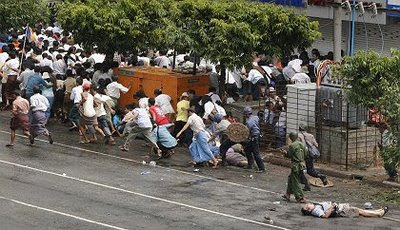
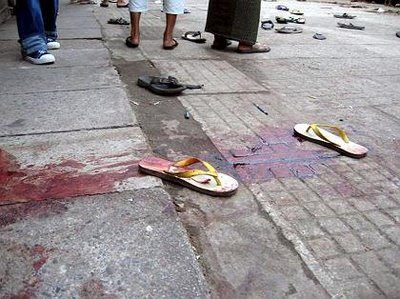
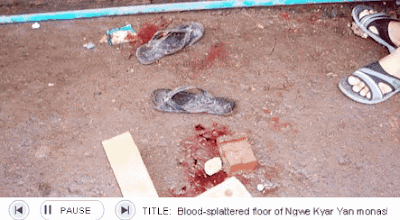
These are some of the pictures posted by Myanmarese bloggers from the events that have taken place today.
Sources:
http://ko-htike.blogspot.com/
http://mr-jade.blogspot.com/
http://www.irrawaddy.org/protests/BurmaProtests.php
Here’s what ko-htike wrote:
To all folk, it is really bad in YGN, pLs can someone do something for our country, now inside YGN it has been look like War Zone, i even heard stooting over the phone. it is over 50 shots, right now. but people are not giving up to protest and more and more people coming out to street.
they even used tear gas into primary school.
Now, the government is trying to make a diversion. They give 10,000 kyats (around $7) & a set of Thin Gan(yellow robe) to “Swan Arr Shin”(like USDA which the form as a group that to crash down violently to protester) team and make them to pretend as Monks. Then, command to destroy the Islamic Mosque. This intends to become a fight between Buddhisms & Islams. So, if u hear or see the news that the monks are destroying the Mosque, these are not real monks. They are just fakes. As u all know, the real monks have no intention like that. So, give this information to Islams who u know and tell them
Today picture in Sule around noon before open fire(now regime open fire into these group, and used fireengine to sweep the blood on the street )
I heard that the Singapore government is on standby to evacuate Singaporeans from Yangon if it gets really ugly. The Singapore government knows a massacre is looming. But they are just talking and issuing statements.
Drastic action is needed NOW. Singapore and ASEAN have always boasted that their constructive engagement of Myanmar made it easier to dialogue with them. Now is the time to use that relational capital. Take out the big stick and tell the generals that they are out of ASEAN if they use any more deadly force of civilians. Singaporeans need to tell our government to stop hiding behind diplomatic statements! And Malaysia, Indonesia, Philippines, Thailand, what are they all doing?
In an interview with the Straits Times, Singapore Foreign Minister George Yeo was asked what ASEAN would do if the junta becomes more repressive in the weeks to come. The minister said, “If…there is repression and violence where many people die…ASEAN can issue statements. ASEAN can shed tears. But at that point in time, it will be a fight within Myanmar itself.”
Bravo! Let’s just wash our hands clean of this and say, “What to do? Die, die lor!”.
ASEAN has proven itself to be one huge, big talkshop. No action, talk only.
Singapore-led ASEAN must take immediate, concrete action in Myanmar to prevent bloodshed
Today, I read the sad news in TODAY that carried an AFP report that at least five monks and one civilian were killed by Myanmar’s security forces. Witnesses said they saw one monk with a gunshot wound to the head.
Channel NewsAsia reported that two monks were beaten to death by riot police. A total of four people were reported killed when security forces used live ammunition on protesters.
The Irrawady has reported that on Sep 26, three monks were shot by military and riot police forces in Ahlone Township. Two monks and one nun were reportedly shot by military forces near Sule Pagoda. Another source told The Irrawaddy earlier that one of the injured died, but the report cannot be confirmed. At least two protestors were shot by security forces in downtown Yangon near Sule Pagoda. One protestor reportedly died, according to people who took part in the demonstration. The source said the soldiers continued firing at the demonstrators, who numbered several thousand. At the famous Shwedagon Pagoda, riot police beat some monks and dragged others away into waiting trucks.
I expect that these are just the opening volleys. A dawn to dusk curfew has already been ordered. The suffering people of Myanmar are not going to just give up and stay home. They know there is no turning back. They are going to continue to come out on the streets, violating the curfew. The military, sensing the threat to its existence, is going to start using Tiananmen-style measures to suppress them. This might include rolling out tanks and machine-gunning down crowds of unarmed civilians. An estimated 3,000 students and monks died in the pro-democracy uprising in 1988.
As all this murder is being committed against unarmed civilans, what is ASEAN doing? What is Singapore, the current chairman of ASEAN doing?
The Singapore Government has issued several statements voicing “concern” for the situation. It is quite obvious that our government cares more about the damage Myanmar is doing to ASEAN’s credibility, than the deaths of the protesters.
Singapore is now throwing its support behind the UN mission to Myanmar, which is led by Dr Ibrahim Gambari, a former Nigerian diplomat. While I applaud Dr Gambari and the UN’s effort, why is it that ASEAN cannot take the lead to bear down pressure on the military junta not to massacre its own people again, like it did 19 years ago?
Singapore is now the chairman of ASEAN. The Singapore Government’s lack of leadership in the situation in Myanmar makes me feel ashamed — absolutely ashamed — as a Singaporean!
The Government will reiterate its excuse that the generals do not listen to us. So do we think that they will listen to a non-Asian diplomat from the UN? The fact is that besides China and India, ASEAN wields the most influence over that reclusive regime.
Singapore should be assembling together a high-level ASEAN mission comprising at least Indonesia, Malaysia, Thailand and Philippines to make a immediate trip to Myanmar’s capital to warn the generals not to open fire into the protesting crowds, and threaten to suspend Myanmar from ASEAN if it does so. Forget the so-called principle of non-interference in the domestic affairs of fellow ASEAN members. This situation calls for concrete action! ASEAN has a responsibility to protect the people of Myanmar and prevent massive bloodshed.
Even if the Myanmar authorities refuse to entertain the ASEAN mission, there are still other avenues to pursue. ASEAN could approach China and India, Myanmar’s strongest backers, to call on them to turn the screw on the junta. These two countries have tremendous leverage on the generals, because they are the lifeline of support (both financial and diplomatic) for the regime. It is in both their interest that the situation in Myanmar doesn’t boil over, because it will affect their own credibility, especially Beijing’s, as it is hosting next year’s Olympic Games.
The time for action is NOW. We must not wait for the soldiers to spray bullets and roll tanks into crowds of monks, nuns and students before we issue statements of “regret”. The ASEAN Summit celebrating the grouping’s 40th Anniversary is going to be held in Singapore in November. Does the Singapore Government want to lay out the red carpet for the generals whose hands are still dripping with the fresh blood of their own people?
Singaporeans can take action too. You can sign a worldwide petition to be sent to the UN Security Council (including China).
Or better still, blog about it to show our government and the people of Myanmar that Singaporeans care. Send a message to our Government that its inaction will have domestic political implications for our leaders too.
PM Abe’s resignation: More lessons from the Land of the Rising Sun
Japanese Prime Minister Shinzo Abe announced his resignation today after less than a year in office. This followed a defeat of his party, the Liberal Democratic Party, in the recent upper house elections as well as a string of scandals involving ministers in his Cabinet.
I’m not an expert in Japanese politics, but from what I have read, I thought Abe was doing a pretty decent job, especially on the international front. Under his leadership, relations with China improved tremendously, with a series of high level exchanges of visits between leaders of both countries — Abe made Beijing his first foreign visit, and Chinese Premier Wen Jiabao also made a successful visit to Japan.
Abe had great dreams of making Japan a “normal” nation once again. He converted the Defense Agency to a full fledged Ministry, and pledged to rewrite Japan’s pacifist Constitution. While the Constitution may have been music to the ears of Asians who suffered under Imperial Japan in the Second World War (and much earlier, in the case of Korea and China), it also made it very difficult for Japan to fulfill its international obligations as the second richest country in the world — for example contributing to the military aspects of reconstruction in Iraq and Afghanistan.
Unfortunately, his focus on international affairs and ideological aspects of Japan’s future, coupled with his poor performance domestically, led to his downfall. Channel NewsAsia reported:
Rural voters deserted the LDP in droves in the recent election, failing to relate to Abe’s ideological agenda, which focused on building Japan’s global standing and rewriting the constitution.
But the campaign failed to resonate among voters as the opposition pressed on bread-and-butter concerns such as mismanagement of the pension system and income inequality.
What lessons does this hold for Singapore?
I think voters are the same in Japan, Singapore and anywhere else. Bread-and-butter issues will always take precedence over international affairs or idealogical pursuits, no matter what the merits of the latter are.
This is the key reason why the PAP has been able to win election after election since 1959. They know the vast majority voters don’t give a hoot about what Singapore’s international standing is, or whether they uphold human rights or press freedom. What they care about is whether or not life will get easier for them and their families over the next five years.
Is it any wonder then that Dr Chee Soon Juan and his ilk are finding it so hard to get support from mainstream Singaporeans? I admire Dr Chee for what he is fighting for. I don’t think he is out to bring Singapore down. But I also think his focus on spreading liberal democracy and human rights in Singapore is not going to win him many voters–as least not until our “unfreedoms” directly hit our pocketbooks. Without voter support, you can’t win a seat in Parliament. And without enough opposition seats in Parliament, the Government will never really feel any threat to its position and can continue enact policies with impunity.
The key, then, for a successful political party would be to focus on issues that matter to everyday Singaporeans — jobs, child support, education, retirement. Values and ideology should still be the guiding light of our leaders, but these values need to be melted into butter which can spread on the bread of the common man.
